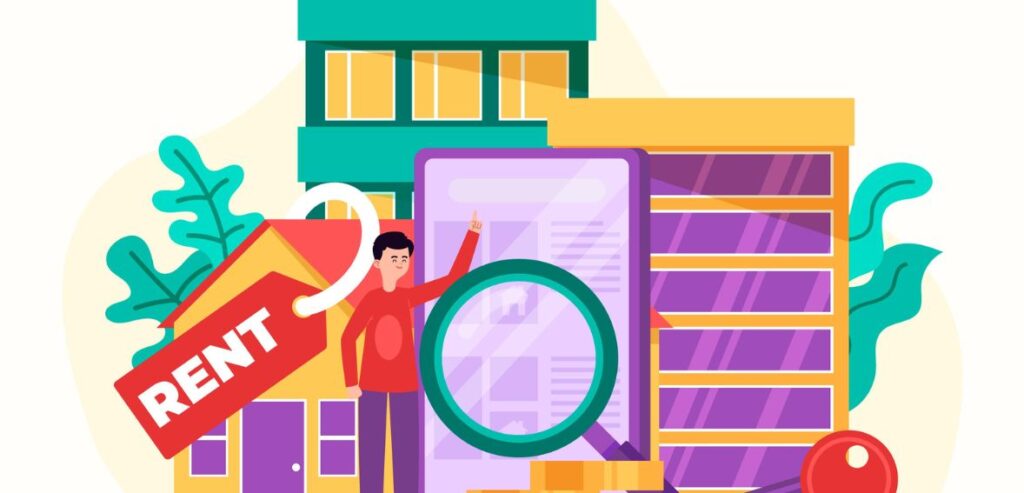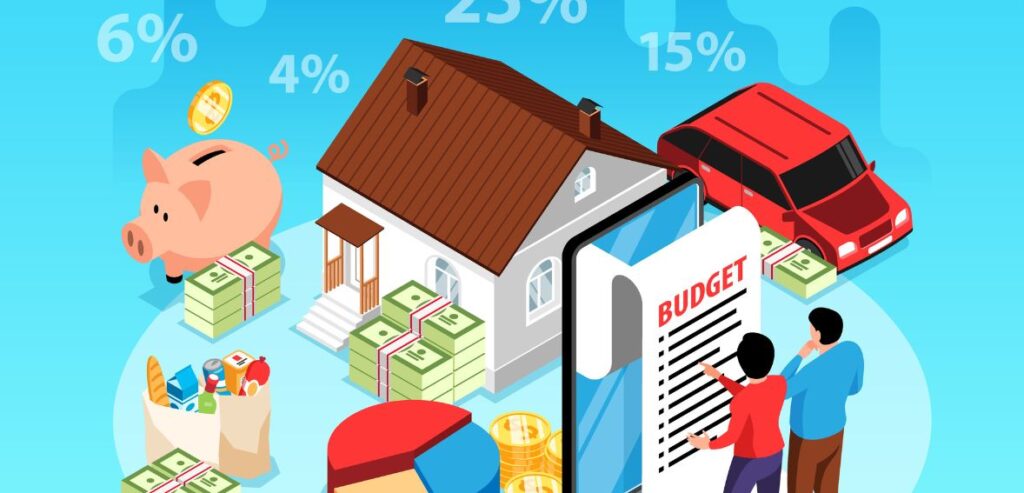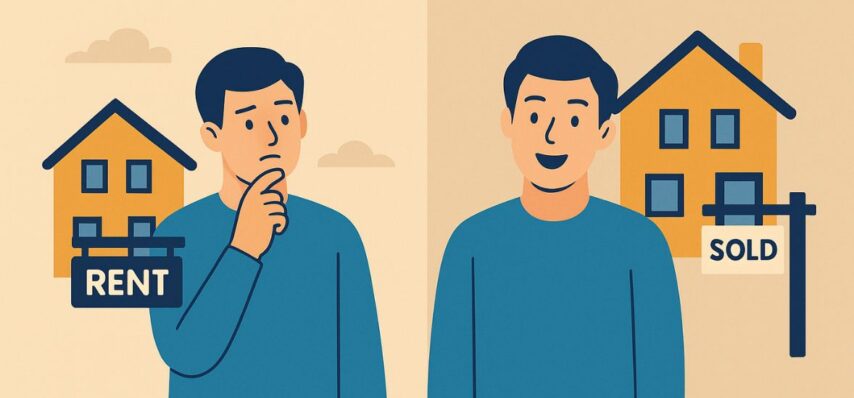How to Decide Between Renting and Buying a Home
One of the most significant financial decisions people have to make is whether to buy or rent a home. It involves more than just finding a place to live; it consists in determining your financial future, way of life, and sense of security. It’s never easy to decide between the long-term commitment of buying and the flexibility of renting because each option has its own pros and cons.
In a world that is changing quickly and where flexibility and mobility are highly prized, renting might seem like the better choice to some. For others, purchasing provides the long-term financial advantages that come with accumulating equity, the security of ownership, and the pride of owning a home. There is no one correct answer, which makes this decision challenging. Which option makes the most sense depends on a person’s circumstances, including their income, savings, career path, family objectives, and even personality.
Although financial calculators are capable of performing mathematical calculations, they are rarely able to account for the emotional significance of domestic choices or the unforeseen factors that life invariably introduces. As a result, choosing to buy or rent depends more on matching your lifestyle goals and financial resources with the housing market’s realities than it does on figuring out the “right” formula.
The Financial Side of Renting

Renting is the first step toward independent living for a lot of people. Because it doesn’t require the kind of upfront investment that homeownership does, it is frequently the most affordable choice. Although a security deposit and possibly the first and last month’s rent are required of renters, these expenses are insignificant when compared to the down payment, closing costs, and continuing upkeep that accompany purchasing a home.
In this way, renting provides a certain amount of liquidity and financial freedom. Renters can free up more money for other priorities like debt repayment, investing, or emergency fund building. Predictability is another financial benefit of renting. Over the course of a lease, renters rarely have to deal with unforeseen expenses like roof replacement or a broken furnace, and monthly rent payments are generally consistent.
Tenants can plan their budgets with fewer surprises because landlords are usually in charge of maintenance and repairs. Although rents do have a tendency to increase over time, especially in areas with high demand, tenants have the option to relocate if expenses become unaffordable. One of the main reasons why many people, particularly those just starting in their careers, prefer renting to buying is this flexibility.
The Financial Side of Buying
However, buying a home can be one of the most effective strategies to increase wealth over time. Mortgage payments progressively raise your ownership stake in a property, in contrast to rent payments, which vanish into the landlord’s pocket. In essence, this procedure, called “building equity,” enables you to turn housing expenses into a monetary asset that could appreciate over time.
Despite brief downturns in the housing market, real estate has historically shown itself to be a dependable long-term investment, with homes increasing in value in many areas. The possibility of stabilizing housing costs is an additional financial incentive to purchase. Homeowners can protect themselves from the volatility of rising rents by locking in their monthly payments for decades with a fixed-rate mortgage.
Furthermore, some jurisdictions offer potential tax advantages that can partially offset the costs of ownership, such as deductions for property taxes and mortgage interest. Homeowners may also use store-branded financing options such as the Home Depot credit card to manage renovation expenses—though these bring their own terms and interest rates to consider. But these monetary advantages come with a lot of duties. Homeowners need to budget for continuing maintenance costs, homeowner’s insurance, and property taxes. Thus, even though purchasing a home can be financially beneficial, it also calls for self-control and long-term planning.
Lifestyle Flexibility and Renting

Beyond the cost, renting gives people and families flexibility in their lifestyle, which appeals to many. Renting eliminates the hassle of selling a house, which is beneficial for people whose jobs require them to be mobile, such as consultants, healthcare professionals, or those in industries that frequently relocate. A lease, which usually lasts a year or two, offers a natural way out without any long-term commitments.
Renters can change their housing even within the same city if their lives change. For example, they can downsize to save money, upgrade to a larger apartment, or move closer to their place of employment. Additionally, renting gives you access to housing options that you might not otherwise have.
Facilities like gyms, swimming pools, and concierge services are frequently found in apartment buildings or rental communities and would be expensive to maintain as a homeowner. Renting can feel like a lifestyle upgrade for retirees or young professionals looking for convenience without the hassles of maintenance.
Lifestyle Stability and Buying

Owning a home provides a genuine sense of stability and permanence, unlike renting. Owning a home allows you to customize your living area to fit your needs, whether that means updating the kitchen, growing a garden, or just knowing that the area is yours to do as you see fit. Beyond the obvious physical changes, owning a property provides emotional fulfillment and serves as a basis for a family’s long-term roots.
This stability frequently carries over into the community for families. Growing up in the same neighborhood, forming enduring friendships, and maintaining connections through schools and extracurricular activities are all beneficial to kids. Purchasing a home also signifies a significant life accomplishment for many, enhancing their sense of security and independence. It represents achievement, a sense of belonging, and a stable future more than just a place to live.
The Hidden Costs of Buying

Ownership involves financial strain, even though it also offers pride and the possibility of wealth accumulation. The hidden costs of upkeep and unforeseen repairs are among the most disregarded considerations when purchasing a home—even property taxes, such as those in Delaware, can vary significantly by county, adding unexpected costs for new homeowners. Understanding local Delaware property taxes is crucial to creating an accurate long-term budget for buying. Plumbing problems, a malfunctioning HVAC system, or a leaky roof can cause unforeseen costs totaling thousands of dollars. These unforeseen expenses can be taxing, particularly for first-time purchasers who might not have saved enough money for an emergency.
Homeowners also have to pay insurance premiums and property taxes, which can increase suddenly. Over time, these expenses might equal or even surpass mortgage payments, depending on where you live. In contrast to rent, which usually covers a fixed monthly amount, homeownership entails ongoing and unpredictable financial obligations that call for both discipline and foresight. For some households, the pride of ownership may be overshadowed by the stress of fulfilling these responsibilities.
Opportunity Costs of Renting
Although it has flexibility, renting has a number of long-term disadvantages. The absence of equity is the most important. Long-term renters may not be able to accumulate as much wealth as homeowners because rent payments do not help establish financial ownership in a property. Renters may have little to show for their investment over decades if the total cost of rent greatly exceeds the cost of purchasing.
Furthermore, landlords have the final say over renters. Tenants may be forced to relocate against their will due to rent increases, modifications to building regulations, or decisions to sell the property. Because many landlords forbid making structural alterations or painting walls, there is also less freedom to customize a rental property. For individuals who value stability and personal control over their environment, these limitations can make renting feel restrictive.
Considering Life Stage and Goals
Knowing your life stage and personal objectives is essential when choosing to buy or rent. Early-career young adults may prefer flexibility to stability, particularly if they expect to move or change jobs. In this instance, renting offers mobility without the financial commitments associated with home ownership. However, buying might be the more sensible and fulfilling option for people who intend to settle down, start a family, or stay in one place for a long time.
Additionally, retirees have particular considerations. Some people find financial relief and freedom from maintenance duties when they sell their long-owned house and move into a rental. In order to preserve their independence and benefit from the financial stability that comes with not having a mortgage, some people might choose to downsize to a smaller home that they own outright. Which choice best suits your priorities ultimately depends on where you are in life.
The Role of Market Conditions

The decision is also significantly influenced by the larger housing market. For many households, renting might be their only option in areas where real estate prices have risen dramatically above income growth. On the other hand, purchasing may make more financial sense in markets where home prices are still reasonable in comparison to rent.
Another important factor is interest rates; while higher rates can make the cost of ownership unaffordable, lower rates make purchasing more accessible. The environment is further shaped by economic factors like inflation, employment security, and credit availability. For example, since renting avoids long-term obligations, it may feel safer during uncertain economic times. On the other hand, homeownership may seem like a smart investment that capitalizes on advantageous lending conditions in economies that are stable or expanding.
Long-Term Vision
In the end, your long-term life goals should guide your decision to buy or rent. It requires achieving a balance between present financial realities and long-term goals. Consider not just where you want to live now but also how you see your family, finances, and way of life developing over the next ten years. Do you value freedom and flexibility more than stability and control?
A clear vision will help you navigate the trade-offs inherent in both renting and buying. Neither option is inherently better; both have value depending on context. By aligning your housing choice with your financial goals and lifestyle preferences, you can create a living situation that feels right for you, both today and in the years to come.
Conclusion
One of the most important and financially impactful decisions you will make is whether to buy or rent a home. It involves values, priorities, and long-term objectives in addition to numbers. Renting is a good option for people in transitional life stages or in rapidly evolving markets because it provides mobility, convenience, and financial liquidity.
In contrast, purchasing offers stability, the possibility of gathering wealth, and the emotional fulfillment that comes with ownership; however, it necessitates a sustained commitment and sound financial management. Ultimately, the optimal choice strikes a balance between practical and subjective factors. The important thing is to approach the decision with clarity, honesty about your situation, and a future-focused vision, regardless of whether you decide to buy or rent. When aligned thoughtfully, your choice will not only provide shelter but also support the life you aspire to build.



